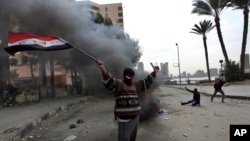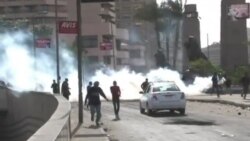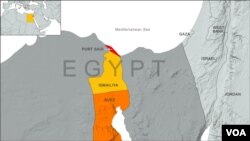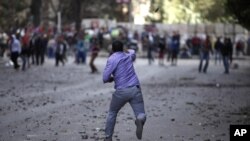CAIRO —
Protesters and riot police clashed in Cairo and elsewhere in Egypt on Monday, after Egyptian President Mohamed Morsi declared a 30-day state of emergency in three provinces at the center of deadly anti-government riots.
Demonstrators defied the imposition of emergency law in Port Said, Ismailiya and Suez, vowing to continue to protest.
Many in the political opposition have also rebuffed the president, saying Monday that they would not take part in his call for a national dialogue to help ease the tensions.
Mohammed ElBaradei, who heads the opposition Dostour Party, spoke at a news conference, even as violence flared in the capital.
The Nobel Prize winner said opposition forces are ready for dialogue, but not a dialogue that they know "will just lead to a dead end."
Watch related video of protests in Egypt
The violence began last week as Egyptians marked the second anniversary of their revolution. It erupted again after a Cairo court sentenced to death 21 people, many of them Port Said residents, for their role in a deadly football riot last year.
The nationwide unrest shows deep divisions in the aftermath of the uprising.
President Morsi enjoys the support of the Muslim Brotherhood and other Islamists. But other Egyptians complain of a deteriorating economy and a failure to address such questions as social justice.
The wrath of many taking to the streets is focused on the police.
In Port Said and elsewhere, fans, known as Ultras, have long been suspicious of Interior Ministry forces, which they accuse of excessive use of force and lack of accountability.
Political activist and prominent blogger Wael Khalil said that there are numerous sources of discontent, but the overwhelming cause of the current unrest is anger at the police, which he says has remained unaccountable for decades.
"This is really an intact institution of the old regime and it's continuing, and now it seems like Morsi and the Brotherhood are embracing it as their own," he said.
Khalil said that imposing emergency law will not solve an underlying problem of police impunity and the anger it provokes, adding, that until the president addresses the issue, "he is just harming himself."
Watch video of analysis by political activist Wael Khalil
Egypt's Cabinet approved on Monday a draft law allowing Mr. Morsi to deploy the army to assist the police in providing security, including arresting civilians.
Nearly 50 people have died in violence that began last Thursday. Port Said has been the worst-hit area, with at least 37 people killed.
Demonstrators defied the imposition of emergency law in Port Said, Ismailiya and Suez, vowing to continue to protest.
Many in the political opposition have also rebuffed the president, saying Monday that they would not take part in his call for a national dialogue to help ease the tensions.
Mohammed ElBaradei, who heads the opposition Dostour Party, spoke at a news conference, even as violence flared in the capital.
The Nobel Prize winner said opposition forces are ready for dialogue, but not a dialogue that they know "will just lead to a dead end."
Watch related video of protests in Egypt
The violence began last week as Egyptians marked the second anniversary of their revolution. It erupted again after a Cairo court sentenced to death 21 people, many of them Port Said residents, for their role in a deadly football riot last year.
The nationwide unrest shows deep divisions in the aftermath of the uprising.
President Morsi enjoys the support of the Muslim Brotherhood and other Islamists. But other Egyptians complain of a deteriorating economy and a failure to address such questions as social justice.
The wrath of many taking to the streets is focused on the police.
In Port Said and elsewhere, fans, known as Ultras, have long been suspicious of Interior Ministry forces, which they accuse of excessive use of force and lack of accountability.
Political activist and prominent blogger Wael Khalil said that there are numerous sources of discontent, but the overwhelming cause of the current unrest is anger at the police, which he says has remained unaccountable for decades.
"This is really an intact institution of the old regime and it's continuing, and now it seems like Morsi and the Brotherhood are embracing it as their own," he said.
Khalil said that imposing emergency law will not solve an underlying problem of police impunity and the anger it provokes, adding, that until the president addresses the issue, "he is just harming himself."
Watch video of analysis by political activist Wael Khalil
Egypt's Cabinet approved on Monday a draft law allowing Mr. Morsi to deploy the army to assist the police in providing security, including arresting civilians.
Nearly 50 people have died in violence that began last Thursday. Port Said has been the worst-hit area, with at least 37 people killed.








